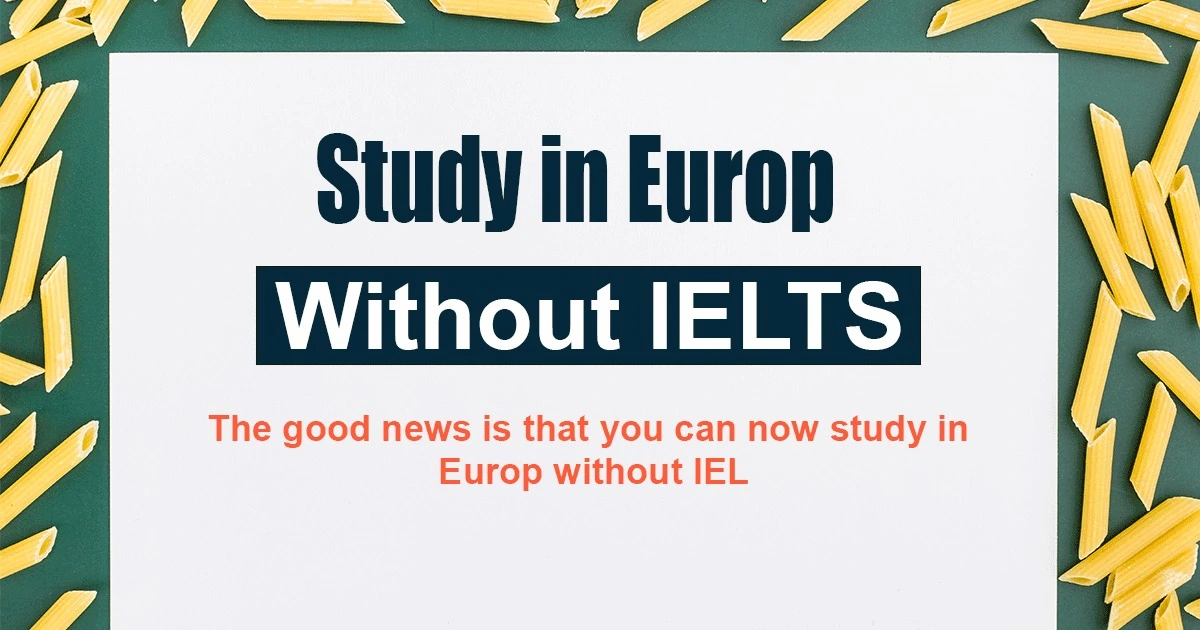Overview
Thinking about studying in Germany in 2026 but worried about taking the IELTS exam? Good news — it’s possible to study in Germany without IELTS and still secure admission to many top-ranked universities.
Germany remains one of the most affordable and high-quality destinations for international students, offering free education at most public universities, strong career prospects, and globally recognized degrees.
This guide explains step-by-step how to study in Germany without IELTS, what alternative English proficiency options are accepted, and which universities offer IELTS-free admissions.
Why Study in Germany in 2026?
Germany offers a blend of academic excellence, practical learning, and affordability — making it a global education hub.
Key Benefits of Studying in Germany:
-
No tuition fees at most public universities
-
✅ Study without IELTS under certain conditions
-
Globally recognized degrees
-
Hundreds of programs in English
-
Post-study work visa opportunities
-
Safe and student-friendly environment
-
Affordable living costs compared to other EU countries
Can You Study in Germany Without IELTS in 2026?
Yes — many German universities allow students to apply without IELTS if they can prove their English proficiency through other means.
Universities often accept a Medium of Instruction (MOI) certificate or other recognized English tests.
Alternatives to IELTS Accepted in Germany
If you don’t want to take IELTS, you can choose one of the following options accepted by many universities:
1️⃣ Medium of Instruction (MOI) Certificate
If your previous education (Bachelor’s or Master’s) was conducted entirely in English, your institution can issue an MOI certificate confirming that English was the medium of study.
2️⃣ Other English Proficiency Tests
-
TOEFL iBT: 72–100
-
PTE Academic: 55–70
-
Cambridge English Test: B2–C1 or higher
-
Duolingo English Test: 95–120
-
TOEIC: Accepted in certain business and technical programs
Step-by-Step Guide to Study in Germany Without IELTS
Step 1 – Choose Your University and Course
Look for universities in Germany that offer English-taught programs and accept MOI or alternative tests.
Step 2 – Check Admission Requirements
Visit the university’s official website and confirm the English language exemption policy.
Step 3 – Prepare Required Documents
-
Academic transcripts and certificates
-
MOI certificate or English test results
-
Updated CV and motivation letter
-
Passport copy
-
Recommendation letters
Step 4 – Submit Your Application
Apply through the university’s admission portal or via Uni-Assist, the centralized platform many German universities use.
Step 5 – Receive Admission Letter
Once accepted, you’ll get an offer letter from the university — which you’ll need for your visa application.
Top German Universities That Accept MOI (Without IELTS)
Here are some universities known for offering IELTS exemptions or accepting MOI certificates:
-
University of Siegen
-
Braunschweig University of Technology
-
University of Kaiserslautern
-
Free University of Berlin
-
University of Freiburg
-
RWTH Aachen University
-
University of Giessen
-
University of Hildesheim
✅ Always check each university’s English proficiency requirements before applying, as policies can vary by program.
Student Visa Without IELTS – Is It Possible?
Yes, you can get a German student visa without IELTS if your chosen university confirms that it accepts MOI or other tests.
When applying for a visa, submit:
-
The official acceptance letter from your university
-
MOI certificate or equivalent English proficiency proof
-
Proof of financial resources (blocked account or scholarship confirmation)
German embassies accept these documents if the university’s language exemption is clearly stated.
Study in Germany Without Tuition Fees
One of the biggest advantages of studying in Germany is free education at public universities.
Students only pay a small semester contribution fee — typically between €150 and €300 per semester, covering administration and student union costs.
This makes Germany an affordable option even for international students without scholarships.
Work and Study in Germany
Germany allows international students to work part-time while studying.
You can work:
-
120 full days or 240 half days per year
-
On-campus jobs, internships, or freelance work related to your field
This helps cover living expenses while gaining practical experience.
Cost of Living for Students in Germany
On average, students spend between €700–€1,100 per month, depending on the city and lifestyle.
Estimated Monthly Costs:
-
Accommodation: €350–€500
-
Food: €150–€250
-
Health insurance: €100–€120
-
Transport: €50–€80
-
Miscellaneous: €100–€200
Cities like Leipzig, Dresden, and Aachen are more affordable than Munich or Frankfurt.
Tips to Secure Admission Without IELTS
-
Check each university’s official admission page for IELTS exemption policies.
-
Get an official Medium of Instruction (MOI) certificate from your previous university.
-
Apply early and ensure all documents are accurate.
-
Practice basic German — it helps in daily life and part-time jobs.
Related Resource
Leapscholar: Study in Germany Without IELTS – Universities List
Final Thoughts
Studying in Germany without IELTS in 2026 is easier than you think.
With world-class universities, affordable education, and numerous English-taught programs, Germany offers a perfect blend of quality and accessibility.
By preparing the right documents — especially your MOI certificate — and applying early, you can begin your academic journey in one of Europe’s top education destinations without taking IELTS.
Start planning today and make your dream of studying in Germany a reality!
